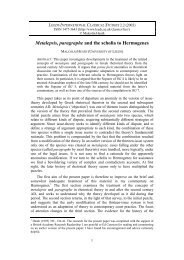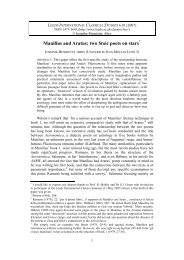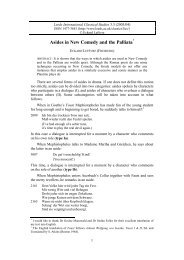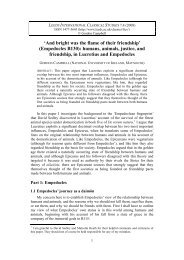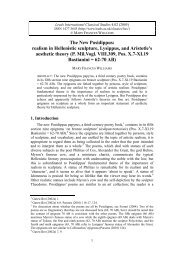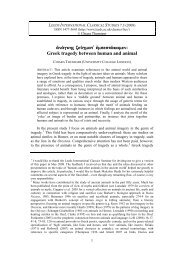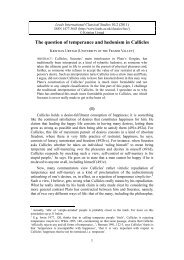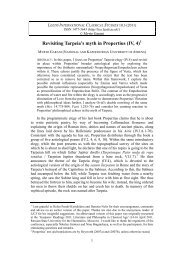Teiresias, the seer of Oedipus the King - Leeds International ...
Teiresias, the seer of Oedipus the King - Leeds International ...
Teiresias, the seer of Oedipus the King - Leeds International ...
Create successful ePaper yourself
Turn your PDF publications into a flip-book with our unique Google optimized e-Paper software.
HANNA M. ROISMAN, TEIRESIAS, THE SEER OF OEDIPUS THE KING<br />
In a previous paper (1999) I suggested that Sophocles included <strong>Teiresias</strong> in<br />
<strong>the</strong> play in order to protest <strong>the</strong> cruelty <strong>of</strong> <strong>the</strong> gods who were allowing <strong>the</strong> A<strong>the</strong>ns<br />
<strong>of</strong> Sophocles’ day to suffer from <strong>the</strong> plague. While I still hold to this view, I have<br />
come to feel that it does not do full justice to <strong>the</strong> pivotal role that <strong>Teiresias</strong><br />
performs in <strong>the</strong> play. This paper, which covers not only Sophocles’ <strong>Teiresias</strong> but<br />
also <strong>the</strong> very different <strong>seer</strong> <strong>of</strong> Seneca’s <strong>Oedipus</strong>, presents <strong>the</strong> development <strong>of</strong> my<br />
thinking on <strong>the</strong> sage. Since one can never answer with certainty <strong>the</strong> question<br />
‘why’ an author did what he or she did, I will shift focus here to <strong>the</strong> interrelated<br />
matters <strong>of</strong> <strong>Teiresias</strong>’ characterization and functions in <strong>the</strong> two plays.<br />
1. Sophocles’ <strong>Teiresias</strong><br />
I start with Sophocles’ characterization <strong>of</strong> <strong>Teiresias</strong>, for this is crucial to both<br />
his dramatic and <strong>the</strong>matic functions in <strong>the</strong> play. <strong>Teiresias</strong> comes on stage a<br />
walking disappointment. The Chorus advise <strong>Oedipus</strong> <strong>of</strong> <strong>Teiresias</strong>’ access to<br />
Apollo’s thoughts and suggest that he may find out <strong>the</strong> murderer’s identity from<br />
<strong>the</strong> god: ‘I know that lord <strong>Teiresias</strong> sees things in <strong>the</strong> same way as Lord Apollo,<br />
from whom anyone examining <strong>the</strong>se things might learn most clearly’, <strong>the</strong>y say<br />
(¥nakt' ¥nakti taÜq' Ðrînt' p…stamai / m£lista Fo…bJ Teires…an, par' oá<br />
tij ¨n / skopîn t£d', ðnax, km£qoi safšstata, 284-6). 3 When <strong>the</strong>y see<br />
<strong>Teiresias</strong> approaching, <strong>the</strong>y speak <strong>of</strong> him as a ‘godly prophet, in whom alone <strong>of</strong><br />
all men truth lives by nature’ (tÕn qe‹on ½dh m£ntin ïd' ¥gousin, ú / t¢lhqj<br />
mpšfuken ¢nqrèpwn mÒnJ, 298f.). <strong>Oedipus</strong>, for his part, greets <strong>Teiresias</strong> as one<br />
who, ‘grasps everything, things that can be taught, and things that are<br />
unspeakable, things that are in heaven, and things that walk <strong>the</strong> earth’ (ð p£nta<br />
nwmîn Teires…a, didakt£ te / ¥rrht£ t' oÙr£ni£ te kaˆ cqonostibÁ, 300f.). 4<br />
Listening closely, one may detect a certain tentativeness in <strong>the</strong>se lines. The<br />
Chorus says that one ‘might learn’ <strong>the</strong> murder’s identity from <strong>Teiresias</strong>, using <strong>the</strong><br />
optative form km£qoi, not that one will learn it. <strong>Oedipus</strong> observes that some <strong>of</strong><br />
what <strong>Teiresias</strong> knows is unspeakable. None<strong>the</strong>less, <strong>the</strong>ir expectations are <strong>of</strong> an allknowing<br />
<strong>seer</strong> who will unravel <strong>the</strong> mystery <strong>of</strong> <strong>the</strong> pollution that has been<br />
afflicting <strong>the</strong>ir city—a <strong>seer</strong> who knows <strong>the</strong> truth and will reveal it.<br />
The <strong>seer</strong> <strong>of</strong> <strong>the</strong>ir expectations is much <strong>the</strong> same venerable and prescient <strong>seer</strong><br />
who, in Homer, had informed Odysseus, from <strong>the</strong> depths <strong>of</strong> <strong>the</strong> O<strong>the</strong>rworld, how<br />
to return home to Ithaca, what would await him <strong>the</strong>re and how he would end his<br />
days, and who had advised him on <strong>the</strong> pitfalls to avoid—namely <strong>the</strong> island <strong>of</strong><br />
Thrinacia and <strong>the</strong> cattle <strong>of</strong> Helios—and on <strong>the</strong> rituals to perform. The Homeric<br />
<strong>Teiresias</strong> is a <strong>seer</strong> who warns and informs. In this respect, he serves Sophocles as<br />
a model for <strong>the</strong> <strong>Teiresias</strong> <strong>of</strong> <strong>the</strong> Antigone, who urges Creon to retract his refusal to<br />
allow <strong>the</strong> burial <strong>of</strong> Polynices and warns him <strong>of</strong> <strong>the</strong> consequences <strong>of</strong> his obstinacy,<br />
3 I follow Jebb, on line 284, in reading taÜq' Ðrînt' as ‘seeing in <strong>the</strong> same manner’.<br />
4 Champlin (1969) 339 comments: ‘Was <strong>Teiresias</strong>, as an exponent <strong>of</strong> truth, on <strong>the</strong> general level <strong>of</strong><br />
an Old Testament prophet? Sophocles speaks <strong>of</strong> him as cognizant <strong>of</strong> ineffable heavenly matters.<br />
The strictures <strong>of</strong> <strong>the</strong> play demanded only that he possess a full awareness <strong>of</strong> past and future human<br />
affairs.’ Owen (1968) 33, describes <strong>Teiresias</strong> as one ‘whose name stands in story as synonymous<br />
with true prophecy.’ For <strong>the</strong> suggestion that <strong>Teiresias</strong> might not speak what scholars assume to be<br />
<strong>the</strong> ‘truth’ see Ahl (1991) 88f.<br />
2



